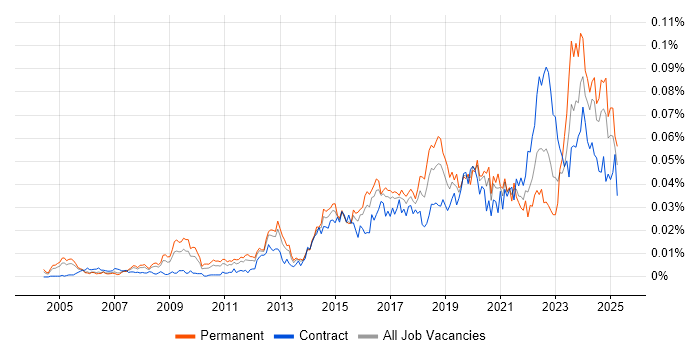Infrastructure Security Engineer
UK
The median Infrastructure Security Engineer salary in the UK is £51,250 per year, according to job vacancies posted during the 6 months leading to 17 May 2025.
The table below provides salary benchmarking and summary statistics, comparing them to the same period in the previous two years.
| 6 months to 17 May 2025 |
Same period 2024 | Same period 2023 | |
|---|---|---|---|
| Rank | 695 | 825 | 953 |
| Rank change year-on-year | +130 | +128 | +240 |
| Permanent jobs requiring an Infrastructure Security Engineer | 35 | 74 | 17 |
| As % of all permanent jobs advertised in the UK | 0.063% | 0.074% | 0.017% |
| As % of the Job Titles category | 0.069% | 0.078% | 0.019% |
| Number of salaries quoted | 34 | 71 | 17 |
| 10th Percentile | £37,716 | £35,000 | £43,250 |
| 25th Percentile | £43,125 | £35,920 | £53,000 |
| Median annual salary (50th Percentile) | £51,250 | £45,000 | £60,000 |
| Median % change year-on-year | +13.89% | -25.00% | +14.29% |
| 75th Percentile | £62,500 | £67,968 | £72,500 |
| 90th Percentile | £77,500 | £70,000 | £98,250 |
| UK excluding London median annual salary | £50,000 | £45,000 | £47,500 |
| % change year-on-year | +11.11% | -5.26% | -9.52% |
All Permanent IT Job Vacancies
UK
For comparison with the information above, the following table provides summary statistics for all permanent IT job vacancies. Most job vacancies include a discernible job title that can be normalized. As such, the figures in the second row provide an indication of the number of permanent jobs in our overall sample.
| Permanent vacancies in the UK with a recognized job title | 50,706 | 94,386 | 91,123 |
| % of permanent jobs with a recognized job title | 90.83% | 94.69% | 91.49% |
| Number of salaries quoted | 27,254 | 67,482 | 57,423 |
| 10th Percentile | £29,750 | £28,500 | £32,500 |
| 25th Percentile | £41,250 | £38,500 | £45,000 |
| Median annual salary (50th Percentile) | £56,000 | £52,500 | £60,000 |
| Median % change year-on-year | +6.67% | -12.50% | - |
| 75th Percentile | £73,886 | £71,000 | £80,000 |
| 90th Percentile | £96,250 | £90,000 | £100,000 |
| UK excluding London median annual salary | £51,645 | £50,000 | £53,000 |
| % change year-on-year | +3.29% | -5.66% | +5.64% |
Infrastructure Security Engineer
Job Vacancy Trend
Job postings that featured Infrastructure Security Engineer in the job title as a proportion of all IT jobs advertised.

Infrastructure Security Engineer
Salary Trend
3-month moving average salary quoted in jobs citing Infrastructure Security Engineer.
Infrastructure Security Engineer
Salary Histogram
Salary distribution for jobs citing Infrastructure Security Engineer over the 6 months to 17 May 2025.
Infrastructure Security Engineer
Top 12 Job Locations
The table below looks at the demand and provides a guide to the median salaries quoted in IT jobs citing Infrastructure Security Engineer within the UK over the 6 months to 17 May 2025. The 'Rank Change' column provides an indication of the change in demand within each location based on the same 6 month period last year.
| Location | Rank Change on Same Period Last Year |
Matching Permanent IT Job Ads |
Median Salary Past 6 Months |
Median Salary % Change on Same Period Last Year |
Live Jobs |
|---|---|---|---|---|---|
| England | +101 | 34 | £52,500 | +16.67% | 13 |
| UK excluding London | +131 | 19 | £50,000 | +11.11% | 5 |
| London | +120 | 15 | £60,000 | -25.00% | 7 |
| Work from Home | +109 | 14 | £41,468 | +0.63% | 9 |
| North of England | +15 | 11 | £37,935 | +5.00% | |
| Yorkshire | +57 | 7 | £50,000 | +38.40% | |
| South East | +84 | 5 | £50,000 | +11.11% | 4 |
| Midlands | +48 | 3 | £40,000 | -27.27% | |
| West Midlands | +53 | 2 | £43,968 | -2.29% | |
| North East | +34 | 2 | £47,718 | -24.00% | |
| North West | -16 | 2 | £37,935 | -38.21% | |
| East Midlands | +10 | 1 | £40,000 | -28.89% |
Infrastructure Security Engineer Skill Set
Top 30 Co-occurring Skills and Capabilities
For the 6 months to 17 May 2025, Infrastructure Security Engineer job roles required the following skills and capabilities in order of popularity. The figures indicate the absolute number co-occurrences and as a proportion of all permanent job ads featuring Infrastructure Security Engineer in the job title.
|
|
Infrastructure Security Engineer Skill Set
Co-occurring Skills and Capabilities by Category
The follow tables expand on the table above by listing co-occurrences grouped by category. The same employment type, locality and period is covered with up to 20 co-occurrences shown in each of the following categories:
|
|
|||||||||||||||||||||||||||||||||||||||||||||||||||||||||||||||||||||||||||||||||||||||
|
|
|||||||||||||||||||||||||||||||||||||||||||||||||||||||||||||||||||||||||||||||||||||||
|
|
|||||||||||||||||||||||||||||||||||||||||||||||||||||||||||||||||||||||||||||||||||||||
|
|
|||||||||||||||||||||||||||||||||||||||||||||||||||||||||||||||||||||||||||||||||||||||
|
|
|||||||||||||||||||||||||||||||||||||||||||||||||||||||||||||||||||||||||||||||||||||||
|
|
|||||||||||||||||||||||||||||||||||||||||||||||||||||||||||||||||||||||||||||||||||||||
|
|
|||||||||||||||||||||||||||||||||||||||||||||||||||||||||||||||||||||||||||||||||||||||
